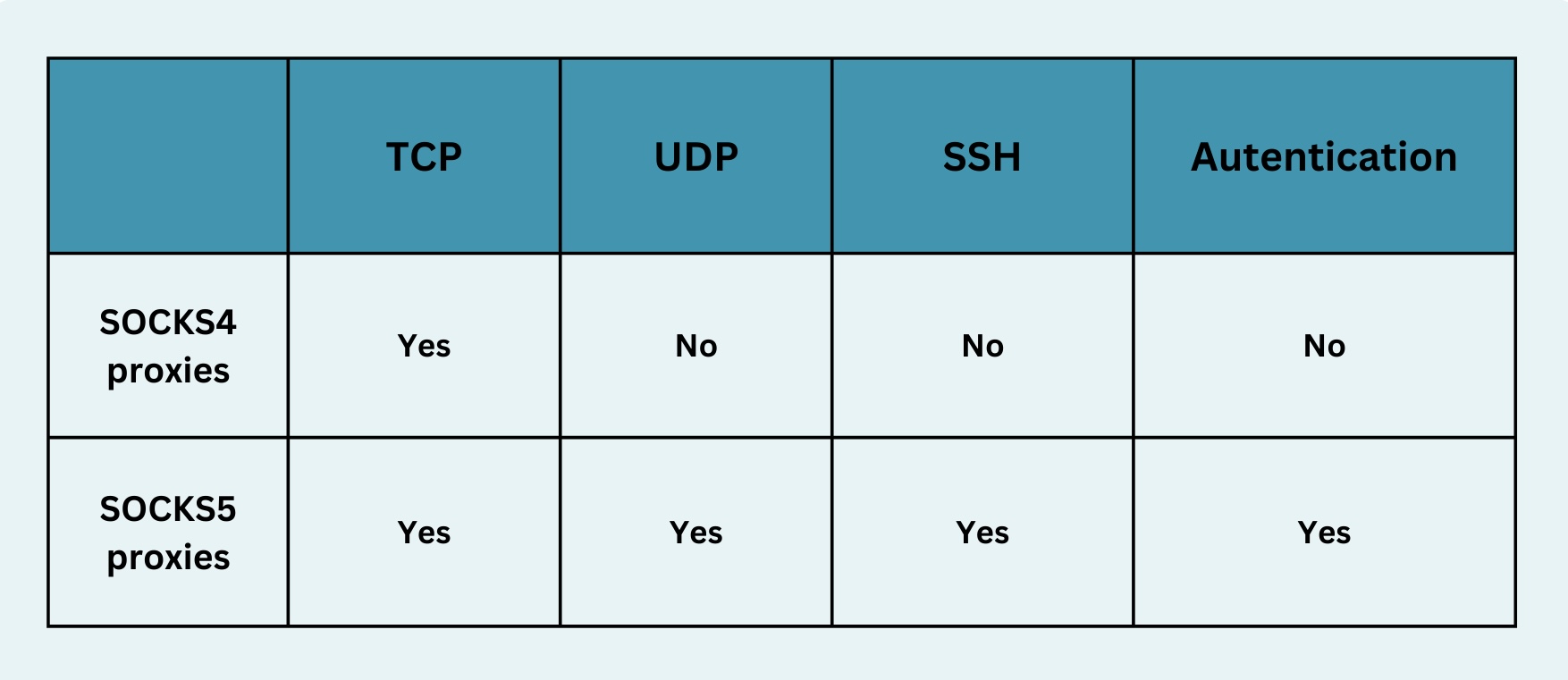What is a SOCKS Proxy?

A SOCKS proxy is a popular choice for many online users, offering versatility and convenience while browsing the internet. Providing anonymity and accessibility, it's a favored proxy solution. The two available versions, SOCKS4 and SOCKS5, vary in functionality and authentication support.
However, the decision between SOCKS4 and SOCKS5 isn't the only consideration when selecting proxy servers. HTTP proxies also offer their own benefits and use cases. If you're feeling overwhelmed by these options, we're here to assist you.
As you may already be aware, our ISP, datacenter, sneaker, and residential proxies all support SOCKS5. In this blog, we'll delve deeper into SOCKS proxies, exploring their versions, benefits, and differences from HTTP proxies. This information will help you make an informed decision.
A SOCKS Proxy – What It Is and How It Works?
A SOCKS proxy is a type of proxy server that supports the SOCKS (Socket Secure) network protocol for establishing connections between servers. Unlike some other proxy protocols, SOCKS doesn't provide tunnel encryption. Instead, it's designed to route all types of traffic from any protocol, whether it's HTTP, HTTPS, TCP, UDP, etc.
In essence, a SOCKS proxy is incredibly versatile because it can handle any kind of traffic generated by any protocol or program. When you use a SOCKS proxy, your internet traffic is routed through another server via either a TCP or UDP connection on your behalf. Like other proxies, it uses its own IP address, keeping your real IP hidden. This makes it ideal for bypassing geo-restrictions and maintaining anonymity online.
Types of SOCKS Proxies – SOCKS4 vs. SOCKS5
SOCKS4 and SOCKS5 are two versions of SOCKS, a layer 5 protocol, the latter being considered superior or more advanced. Both types of SOCKS proxies work the same, connecting your device to the target web servers using another online identity.
While SOCKS4 proxies support SOCKS and TCP protocols only, SOCKS5 proxies support more protocols, including SOCKS, TCP, DNS, UDP, etc. This is why they are more flexible and secure than SOCKS4 proxy servers.
Also, SOCKS5 proxies use the encrypted tunneling technology known as SSH to establish a secure connection, unlike SOCKS4 proxies. They also support multiple authentication methods, providing higher security than SOCKS4 proxies which don’t support authentication at all..

Key Advantages of Using a SOCKS Proxy
Now that you've grasped the basics of SOCKS proxies, it's essential to understand how and when they can be beneficial. Here are the key advantages of utilizing a reliable SOCKS proxy:
- Versatility:
- Improved Performance:
- Anonymity:
- Faster and More Reliable Connections:
- Bypassing Geo-Blocks:
SOCKS5 proxies are capable of handling various types of network traffic, including TCP/IP-based applications, UDP-based applications, and other protocols beyond mere web browsing. This versatility makes them suitable for a wide array of applications such as email clients, FTP, peer-to-peer file sharing, online gaming, and more.
Unlike HTTP proxies, SOCKS proxies do not modify data packet headers, reducing the likelihood of errors. This makes them more efficient and reliable, resulting in better overall performance compared to other proxy types.
SOCKS proxies enhance privacy and anonymity by concealing your actual IP address and location from the websites or services you connect to. By routing your traffic through a proxy server, it becomes challenging for third parties to trace your online activities back to your true identity.
SOCKS5 proxies support multiple protocols, including UDP (User Datagram Protocol), which offers low latency and ensures faster data transfer. This makes SOCKS proxies ideal for time-sensitive applications such as gaming, live calling, and streaming. Selecting a SOCKS5 proxy server close to your geographical location can further enhance connection speed.
SOCKS proxies enable users to bypass geo-restrictions and access region-specific content from anywhere. By connecting through a proxy server located in a supported region, the target website or service recognizes you as a genuine user from that area, granting access to desired content that may otherwise be restricted.
SOCKS Proxy vs. HTTP Proxy
To grasp the distinctions between SOCKS and HTTP proxies, it's crucial to understand how they function as intermediaries between your device and target web servers.
HTTP proxies are tailored for managing HTTP connections exclusively, unlike SOCKS5 proxies. SOCKS proxy servers, on the other hand, are compatible with any port or protocol, allowing for use across multiple applications and diverse scenarios. You even have the flexibility to apply SOCKS proxies to specific apps rather than routing all traffic through them, granting you control over the programs you wish to secure.
Regarding security, neither SOCKS nor HTTP proxies encrypt your traffic by default. However, SOCKS5 proxies utilize SSH tunneling and support various authentication methods (depending on the provider), rendering them a more secure option.
In terms of performance, SOCKS proxies often outshine HTTP proxies as they operate at the transport layer and can manage various traffic types. However, performance levels can vary significantly based on the proxy provider and the quality of SOCKS proxies they offer.
Conclusion
Whether you're an individual seeking to bypass geo-restrictions or a business user interested in tasks like web scraping, ad verification, or social media management, a reliable SOCKS proxy can be invaluable.
Considered the latest and most advanced version, SOCKS5 proxies are often preferred over SOCKS4 or HTTP proxies. However, it's crucial to obtain them from a trustworthy provider to guarantee optimal anonymity, security, and performance.
